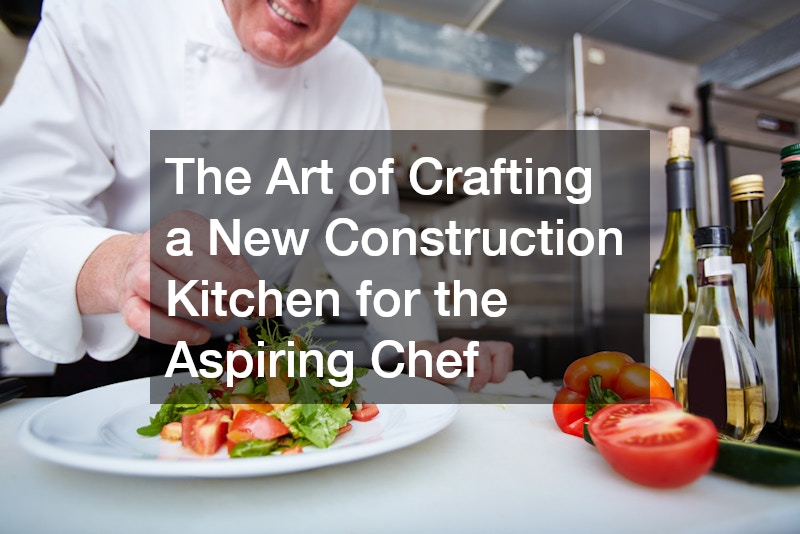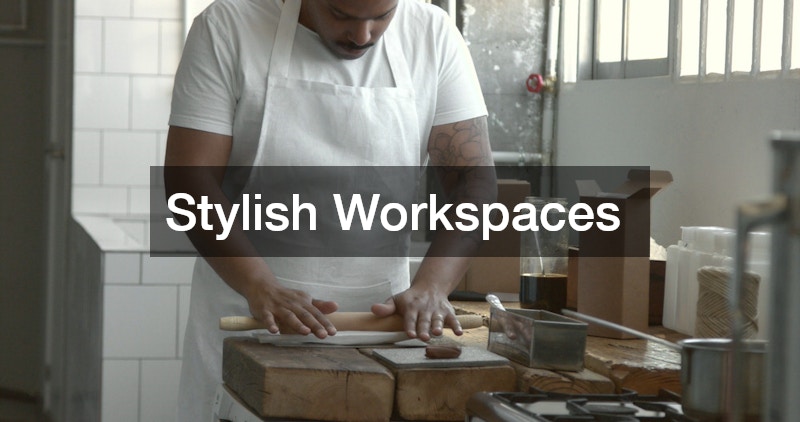
The Art of Crafting a New Construction Kitchen for the Aspiring Chef

Introduction
In the culinary realm, the kitchen is much more than just a functional space; it’s the heart of any home, especially for those who take cooking seriously. Whether you are a professional chef or an enthusiastic home cook, the construction and design of your kitchen can significantly influence your cooking experiences. Building or remodeling a kitchen demands meticulous planning and attention to detail. This ensures the space not only looks good but operates efficiently. The article delves into the intricacies of designing and implementing a chef’s dream kitchen, focusing on new construction kitchens. From innovative storage solutions to selecting resilient countertop materials and high-end appliances, we will explore various facets essential for modern kitchens. By the end of this article, readers will have a clearer understanding of how to envision and execute a kitchen space that meets both current needs and future aspirations. We will also touch on the role of professionals such as remodeling contractors and interior painting companies, who are vital to realizing these visions. Let’s embark on a journey to explore what your new construction kitchen could look like and how to bring that vision to life.
What a Chef’s Kitchen Needs

Every chef desires a kitchen that offers functionality, efficiency, and aesthetic appeal. In terms of new construction kitchens, space planning plays an integral role in delivering an environment that meets these criteria. The layout must accommodate the workflow specific to one’s cooking style, allowing seamless transitions from prep to cooking to serving. Incorporating elements such as spacious countertops, quality appliances, and strategic storage transforms the kitchen into a harmonious workspace.
A well-designed new construction kitchen takes into account kitchen remodeling as a sufficient investment. Remodeling ensures that the latest trends and technologies in kitchen design are incorporated into your space. Whether you opt for sleek modern lines or cozy rustic finishes, it’s essential to harmonize your design aesthetic with the practical requirements of a busy kitchen environment.
Moreover, a chef’s kitchen should accommodate the potential for expansion or modifications. While planning a new construction kitchen, leaving room for future adaptations like adding a new commercial toaster or extra custom kitchen cabinets can be beneficial. By prioritizing both current and predicted needs, homeowners can invest in a kitchen that stands the test of time.
Storage Solutions
In any new construction kitchen, efficient storage solutions are paramount. They provide the order and accessibility required for an efficient cooking experience. Utilizing custom kitchen cabinets allows for tailored space management, ensuring every utensil and device has a home, and minimizing clutter.
Custom kitchen cabinets provide storage options designed specifically with the user’s needs in mind. From adjustable shelving to pull-out organizers, these cabinets can accommodate everything from large pots and pans to smaller gadgets like commercial toasters. Such tailored solutions fortify the kitchen’s usability, making it more than just a cooking space, but a productive area.
For new construction kitchens, considering applied storage technologies like hydraulic systems and soft-close mechanisms in cabinetry enhances functionality. Integrating these features not only amplifies the aesthetic appeal but also the practical aspect, smoothing operations within the kitchen. Aspiring to achieve optimized storage can transform the kitchen into a well-organized culinary heaven.
Planning For the Future
A forward-thinking approach is vital when designing new construction kitchens. Homeowners should aim to craft a kitchen that can adapt to evolving needs and culinary trends. Kitchen renovations often present the challenge of integrating contemporary elements within an existing framework, but with new construction, there is a clean slate to ensure future readiness.
Modern kitchen designs emphasize sustainability and technological advancements, ensuring the kitchen remains relevant and efficient down the road. This may include preemptively wiring for smart appliances, or allocating space for future installations of more energy-efficient equipment. Such considerations are crucial to planning a kitchen that grows with the household.
Furthermore, new construction kitchens should be designed with flexibility in mind. Changing family dynamics or culinary interests can necessitate revisions to the storage, layout, or even appliances. Planning with the future in mind helps facilitate smoother transitions, minimizing the need for comprehensive overhauls and reinforcing the kitchen’s role as a central, adaptable hub within the home.
Staying Updated

Staying informed about the latest in kitchen design and construction is an ongoing process. For new construction kitchens, this means being proactive in seeking the latest in both functionality and style. Engaging with professional remodeling contractors can offer insights into current trends and ensure that your kitchen remains at the forefront of innovative design.
These professionals have the expertise to integrate cutting-edge technologies and materials into your kitchen, whether you’re considering a minor touch-up or a complete overhaul. They can advise on durable, cost-effective materials for a variety of kitchen elements, from sinks to floors, ensuring longevity and aesthetic appeal.
Moreover, a modern kitchen often requires upgrades in technology and appliances, incorporating elements such as energy-efficient lighting and advanced cooking ranges. Staying updated not only means adopting new technology but also involves regular maintenance and timely renovations to keep the space inviting and efficient.
Getting the Right Equipment
Central to any chef’s kitchen is the quality and suitability of its equipment. Investing in modern, high-quality appliances ensures that the kitchen supports all culinary endeavors. For new construction kitchens, a balance between commercial-grade appliances and those suitable for residential use is often sought.
Commercial toasters, heavy-duty ranges, and advanced refrigeration units enhance a kitchen’s capabilities, turning it into a professional culinary setting. The installation of such appliances should be planned to fit seamlessly into the kitchen’s design, ensuring they complement the aesthetics while serving a functional purpose.
Additionally, equipment choice should reflect the chef’s culinary focus, whether that be baking, gourmet cooking, or experimental cuisine. While planning a kitchen space, considering future appliances is crucial, allowing flexibility and scalability for the kitchen’s growth and evolution.
Making the Space Your Own
Personalization is key when designing a space that meets both functional and aesthetic needs. Interior painting companies can help translate personal style into the kitchen environment, offering services that range from color consultation to the application of unique finishes.
A new construction kitchen provides the opportunity to incorporate custom touches, from selecting color palettes to choosing cabinet hardware. Linking the kitchen’s style with personal taste not only enhances the cooking experience but also makes the kitchen a welcoming and pleasant space.
Further customization can involve unique tiles or backsplashes, special lighting fixtures, or personalized storage options. Such elements make the kitchen stand out, reflecting the owner’s tastes and contributing to an inspiring cooking environment.
Stylish Workspaces

An essential component of a functional kitchen is its workspaces, which need to be planned for both versatility and style. The selection of materials, colors, and layouts should complement the overall design of the new construction kitchen while providing ample space for preparation, cooking, and serving.
For example, the incorporation of expansive island units can offer additional workspace while serving as a social hub. The choice of high-quality materials and finishes, such as polished wood or granite slab, can enhance both durability and elegance.
Working with countertop installers can aid in selecting and implementing the best surfaces for a kitchen, considering factors such as ease of cleaning, resistance to heat and scratches, and aesthetic consistency with other elements. A well-executed workspace is multi-functional and aligns practicality with stylistic expression.
Countertop Materials
Countertops play a pivotal role in the functionality and design of a kitchen. Selecting the right countertop material for new construction kitchens is important. Granite slabs, for instance, offer durability coupled with luxurious aesthetics. They withstand high-temperature exposure and resist scratching, making them an excellent choice for active kitchens.
Furthermore, the material chosen impacts the kitchen’s overall aesthetic and maintenance requirements. Alternative materials like quartz and butcher block afford different styles and functionalities, each having its own set of advantages. Choosing appropriate materials involves assessing long-term usability, maintenance needs, and personal preferences.
Engaging with professional countertop installers ensures accurate selection and impeccable installation, maximizing both aesthetics and function. Proper installation prolongs the countertop’s lifespan and performance, ensuring it remains a striking kitchen feature with consistent utility.
Easy-to-Clean Flooring
The flooring of a kitchen can drastically impact its practicality and ambiance. For new construction kitchens, choosing easy-to-clean flooring is vital for maintaining hygiene and visual appeal. Flooring installations that prioritize both durability and ease of maintenance significantly contribute to an efficient kitchen.
Numerous materials like hardwood, tile, or vinyl offer various benefits. Hardwood brings warmth and character, while tiles provide robustness and variety in design. Vinyl floors are increasingly popular due to their durability and lower maintenance requirements compared to natural materials.
Thorough consultation with flooring installation experts can help homeowners select a material that balances aesthetics, usability, and budget. Professional installation safeguards against premature wear and tear, ensuring the kitchen floor remains a steadfast and beautiful foundation.
Appliances, Ventilation, and Lighting

A well-equipped kitchen is orchestrated around smart appliances, robust ventilation, and efficient lighting systems. These elements are pivotal in new construction kitchens, influencing both the functionality and atmosphere of the space.
An electrician‘s expertise can ensure the safe and efficient setup of kitchen lighting and appliances. Modern kitchens benefit from integrated lighting systems that provide clarity during prep and ambiance for social gatherings. Ventilation systems ensure excellent air quality, crucial for an environment where heat and aromas are prevalent.
Furthermore, the selection of energy-efficient appliances contributes to sustainability and long-term cost savings. Combining these elements complements the overall kitchen design, transforming it into a space where cooking is not only practical but also enjoyable.
Conclusion
Building or remodeling a chef’s kitchen requires blending practicality with elegance to create a space that is both functional and inviting. Through a thoughtful new construction kitchen design, one ensures that all components, from storage solutions to high-end appliances, are interconnected for optimal efficiency. Each element discussed, including proper planning with professional advice from remodeling contractors or working with interior painting companies, contributes not just to the kitchen’s current utility, but also to its adaptability for future needs. Countertops and easy-to-clean floors enhance usability and aesthetic appeal, transforming the kitchen into a hospitable environment. Lastly, investing in quality equipment, strategic lighting, and effective ventilation establishes an environment conducive to both creativity and comfort. These considerations, when methodically planned and executed, make a professional-grade kitchen accessible not just to chefs, but to any household determined to upgrade their culinary endeavors. By prioritizing current needs alongside future adjustments, homeowners can ensure their kitchen remains a cherished heart of their home for years to come.
A well-designed kitchen, especially one crafted from scratch, offers significant advantages over mere remodeling. The beauty of new construction is that it provides an opportunity for a fresh start—a blank canvas upon which a dream kitchen can be painted. Unlike remodeling, where structural limitations can sometimes constrain design possibilities, new kitchens offer complete flexibility in terms of layout, workflow, and the integration of cutting-edge technology. Homeowners can take full advantage of modern innovations in smart appliances, energy-efficient systems, and sustainable materials, crafting a space that not only looks beautiful but also works seamlessly for the way they cook and live.
Furthermore, investing in a custom-designed kitchen during construction ensures that every detail aligns with the chef’s specific needs. From specialized storage solutions to accommodating commercial-grade appliances like heavy-duty ranges, commercial toasters, or wine coolers, the possibilities for customization are virtually endless. The layout can be tailored to optimize the chef’s movement, ensuring that every step of meal preparation is as efficient as possible. For those who entertain frequently, the design can also incorporate social spaces—like expansive kitchen islands, built-in bar areas, or cozy nooks for family gatherings—making it a place where both cooking and socializing can coexist harmoniously.
Additionally, new construction kitchens offer long-term benefits that can often outweigh the upfront costs. Thoughtful design choices, such as selecting durable materials, incorporating high-quality appliances, and planning for energy efficiency, contribute to lower maintenance costs and increased property value. A well-executed kitchen will not only provide years of culinary joy but will also make the home more appealing to future buyers, should the homeowner decide to sell. Given the kitchen’s central role in modern homes, a thoughtfully designed space can greatly influence the overall appeal and marketability of the property.
When embarking on the journey to build a new construction kitchen, it’s important to approach the project with a sense of vision and purpose. The kitchen is more than just a functional space—it’s a place where memories are made, families gather, and meals are created with love and passion. Whether you envision a sleek, modern aesthetic or a cozy, rustic charm, your kitchen should reflect your style while providing the functionality needed to meet your daily cooking and entertaining needs. With the right planning, professional guidance, and a focus on both immediate and future needs, your dream kitchen can become a reality, making every culinary endeavor a true pleasure.


